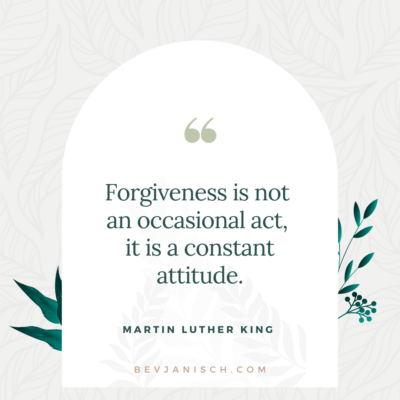Learn How To Forgive To Free Your Heart And Soul And Feel Peaceful
Learning how to forgive is the ultimate spiritual practice and one of the most challenging things we must face as we journey through life. It’s a process that grows our hearts and souls very deeply.
Life gives us many opportunities to forgive and ask ourselves, who do I choose to be in this situation and my life? Do I choose to be hardened and angry with a closed-off heart, or do I choose to be compassionate and loving?
The power of forgiveness enables us to transform toxic emotions concerning others and ourselves. It frees us to feel a deeper sense of inner peace and authentic happiness.
There are significant misunderstandings and confusion about what it means to forgive.
It doesn’t mean that others are not held accountable for their behaviour.
It means we take responsibility for releasing these experiences’ effects on our physical and emotional well-being.
We make forgiveness about our own peace of mind and not the other person.
Forgiveness is an empowering choice.
The first and probably the most crucial step in harnessing the power of forgiveness is deciding whether we are ready to let go of holding onto the toxic feelings.
When we learn how to forgive, we take a giant step in reclaiming our lives and releasing the energy around anger, resentment, and bitterness. I say choose because that’s what forgiveness is—a choice. People who remain in a state of anger and resentment are either not ready to make a choice or aren’t aware they have one to make.
 It’s important to understand that forgiveness is a process that takes time. The power of forgiveness requires that we reaffirm our intention continually and regularly. We are also not saying what happened or how we were treated was acceptable. Instead, we are saying that we are ready to release the toxic hold that the anger and resentment have on us.
It’s important to understand that forgiveness is a process that takes time. The power of forgiveness requires that we reaffirm our intention continually and regularly. We are also not saying what happened or how we were treated was acceptable. Instead, we are saying that we are ready to release the toxic hold that the anger and resentment have on us.
While the process of learning how to forgive often involves several nonlinear steps, it always begins with the intention or desire to forgive.
I have read several books about forgiveness and have engaged in many practices. Some processes include any number of steps, ranging from just a few up to twenty. Twenty steps seemed overwhelming, so I condensed everything I’d read and practiced into six steps.
As the foundation, I used the fourfold path described in The Book of Forgiving by Archbishop Desmond Tutu and his daughter, MPHO Tutu. I modified their process to meet my needs and blend a human and spiritual perspective on forgiveness.
The Tutus’ book includes many beautiful and powerful rituals and practices that support the process of forgiveness. Still, the idea that we “grant forgiveness” didn’t resonate with my spiritual views, so I modified them and came up with the following six steps:
The Six Steps of Forgiveness:
1. Share your story.
It’s important to openly and honestly share your unedited story with someone you trust. If you don’t feel you can do that with another person, writing it in your journal or a notebook that you can subsequently destroy or use in creating a releasing ritual is also effective.
2. Be mindful of your feelings.
You are allowing yourself to feel what you feel is essential for transforming your anger and resentment. We practice mindfulness to recognize our feelings and create space for them without judgment.
3. Develop a 360-degree perspective.
During this process, we become curious about the other person’s perspective and story. We begin to cultivate empathy as we expand our view of the situation and see that this other person, like us, is human and imperfect and may have acted out of hurt or pain in their own life.
4. Shift from victim consciousness to seeing the divine plan.
From a spiritual perspective, we realize that every experience in our lives has been created as an opportunity to fulfill our soul’s purpose and grow. From this perspective, people didn’t do things to us; these situations and people happened to us.
One of my favourite practices is an ancient Hawaiian Forgiveness practice called Ho’oponopono. This article explains How To Do The Ho’Oponopono Spiritual Forgiveness Practice.
5. Create a new relationship or release it altogether.
Every relationship and person comes into our lives for a reason. Sometimes, we are meant to change the relationship; other times, we’re meant to release it.
6. Forgiveness practice.
Learning how to forgive and transform feelings is a process that involves both an intellectual and an energetic shift.
Spending time in a formal meditation practice focused on forgiveness allows us to heal at a deeper level, including the body, mind, and soul.
This process recognizes that while we are spiritual, we are also human beings. It provides a structure and process for forgiveness that begins with telling our story and feeling the hurt and pain that the person or situation triggered in us.
If we jump too quickly to develop a broader 360-degree perspective before we’ve told our story or felt our feelings, we risk not entirely forgiving.
When we bypass the story and emotions, we risk denying and turning away from how we feel because it feels uncomfortable. We may stay in pain if we jump to forgiveness without touching the hurt and telling our story.
We don’t transform hurt by turning our back on it; we transform it by being with it and allowing ourselves to feel it fully.
The journey of learning how to forgive is the ultimate spiritual practice. When we can come to a place where we notice our hearts are open, we truly have experienced the miracle of grace.
If you feel called, please comment below. Our community would love to hear from you!






I recently left my son’s father because of domestic violence. The experience brought up alot of memories and unresolved anger at my stepfather from my childhood. But I have used it as an opportunity to forgive him and stop hanging onto the victim mentality I had been using for years. I am working on fully forgiving my son’s father. I am able to understand how he was feeling in the moments of the assaults. But I still struggle with moments of intense anger about it and reliving it in my head. I have my human version who believes that no man should physically hurt a woman who didn’t physically hurt him. But I don’t want to be angry anymore because its physically affecting me and keeping me stuck. I feel like the anger is drowning out my soul and internally killing me. I am having some confusion about what forgiveness means in this situation. I feel like I have to hate him in order to not be in a relationship with him. I dont want to hate him. I want to forgive. But I also don’t want to stay after what he did. I dont want my son to see me stay and think its normal and ok. I feel I’m not true to myself or respecting myself and I feel there is a deeper connection to the trauma I experienced as a child. Just because my mother stayed doesn’t mean I have to. Just because I saw my mother put up with it doesn’t mean my son has to. I’m caught between moments of understanding and forgiveness but also the anger and hurt I feel. Can you suggest anything that I might be missing or need to know during all of this?
Dear Jennifer,
What courage you have to love yourself enough to leave a situation that is not healthy for you or your son. It’s also very inspiring that you are releasing the “victim mentality” that will keep you stuck and as you said affecting your physical, emotional and spiritual health.
It’s very understandable to have some confusion about what forgiveness means in a situation like this. Forgiveness is about letting go of toxic emotions so that you can feel more peaceful and move forward. You can set the intention to let go of the anger and as you say the “hate” and also honour yourself and your son by not allowing someone that is toxic into your life. It sounds like you have an inner knowing that you are not meant to repeat the patterns that you experienced in childhood and that is very powerful!
It would also be helpful for you to speak with a counsellor in order for you to process and work through the trauma and your feelings. Trust your inner wisdom and enlist some support in order to continue on your most courageous path. So much love to you, Bev